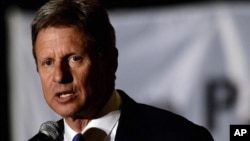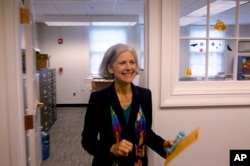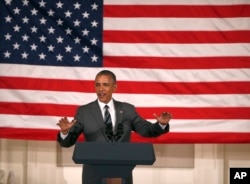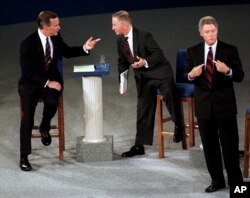With Republicans not exactly united behind Donald Trump and polls showing a majority of voters holding unfavorable views of Democrat Hillary Clinton, Libertarian Party presidential candidate Gary Johnson sees a "real opportunity" for another choice in the race to be the next leader of the United States.
"I do think that Clinton and Trump are the two most polarizing figures in politics today," Johnson said Sunday on ABC's This Week. "And when 50 percent of Americans now declare themselves as independent, I happen to think that they're libertarian, it's just that they don't know it."
His party, which values individual rights over government interference, will formally name its candidate later this month.
But the path for a third-party candidate, from nomination to the November election, contains a number of huge hurdles.
The first, and perhaps biggest, is money.
Campaign financing
Individuals have to declare their candidacy for president with a simple form submitted to the Federal Elections Commission.
So far, more than 1,700 forms have been filed for the 2016 election, though many are clearly joke entries featuring names like Vladimir Putin, Fidel Castro, Rocky Balboa and Buddy the Cat.
To be declared an official candidate, those individuals have to raise at least $5,000 in campaign contributions. To be eligible for federal campaign matching funds during primary season, a candidate has to raise $5,000 in 20 different states.
Fundraising comparisons
According to FEC data, Johnson, with $320,000, and Green Party candidate Jill Stein, with $223,000, were the only third-party candidates to meet that threshold by the end of March.
By comparison, Clinton had raised $180 million and Trump $48 million.
Money becomes even more difficult during the general election.
The same public funding system requires a third party to have received at least 5 percent of the popular vote in the previous election in order to be eligible for funds this year. No third party achieved that level in 2012.
That means this year the major party nominees will be able to receive up to $96 million in federal funding, while third parties can receive nothing.
That does not matter much to Democrats and Republicans, who can easily raise more money on their own. Plus, if a candidate takes the federal money, that is all they are allowed to spend on their campaign.
In 2012, President Barack Obama and challenger Mitt Romney each declined federal funds. Obama did so in 2008 as well.
Public financing
Public financing began in 1976, funded by an optional check box on federal income tax return forms allowing the government to allocate $1 (now $3) from an individual's tax payments.
About 27 percent of taxpayers agreed to that in 1976, but that has fallen to just 5 percent. With candidates not relying on the public money as they once did, the fund's balance now stands at more than $300 million.
But even if they somehow found all $300 million in their campaign account, a third-party candidate also faces the challenge of actually getting his or her name on the ballot.
Requirements vary by state, but range from needing to get a few hundred signatures (Tennessee) to nearly 200,000 (California).
Johnson said Sunday he expects the Libertarians to be the only third party on the ballot in each of the 50 states.
Debates
Next, there is the task of convincing voters.
Debates play a big role in the general election, allowing voters to see the candidates side-by-side, tackling the important issues facing the nation.
The Commission on Presidential Debates has scheduled three debates, beginning in September, and as in past elections is requiring candidates to get 15 percent support in several polls in order to be allowed to participate.
There is not much polling involving third parties yet.
A Monmouth University poll in late March asked people to weigh a potential election involving Trump, Clinton and Johnson. Clinton won with 42 percent, Trump got 34 percent and Johnson had 11 percent.
A third-party or independent candidate has not been allowed in the debates since 1992 when Ross Perot sparred with Republican George H.W. Bush and Democrat Bill Clinton.
History
Perot's 1992 campaign was one of the few that garnered widespread support on election day, winning 19 percent of the popular vote. Since 1912, only one candidate who was not a Democrat or Republican has done better.
Teddy Roosevelt, a two-term president from 1901 to 1909 as a Republican, ran again in 1912 but lost the party's nomination to sitting President William Taft.
Roosevelt formed his own Progressive Party and ended up winning 27 percent of the vote to come in second place, while Taft came in third.
Together, their vote totals would have beaten Democrat Woodrow Wilson who became president.
That kind of result is why Democratic and Republican candidates today are asked if they will pledge to back the party's nominee if they are not chosen. Meanwhile, third-party candidates continue to fight uphill against what has become an entrenched two-party system in the United States.
Obama won the 2012 election with more than 65 million votes nationwide. Romney came in second place with 60 million votes. Johnson was third with just under 1.3 million, while Stein came in fourth with 465,000.










